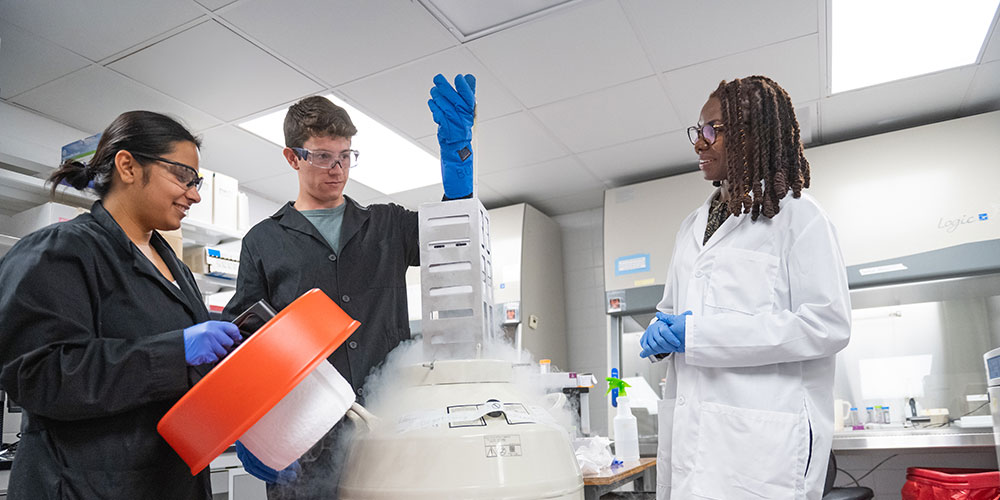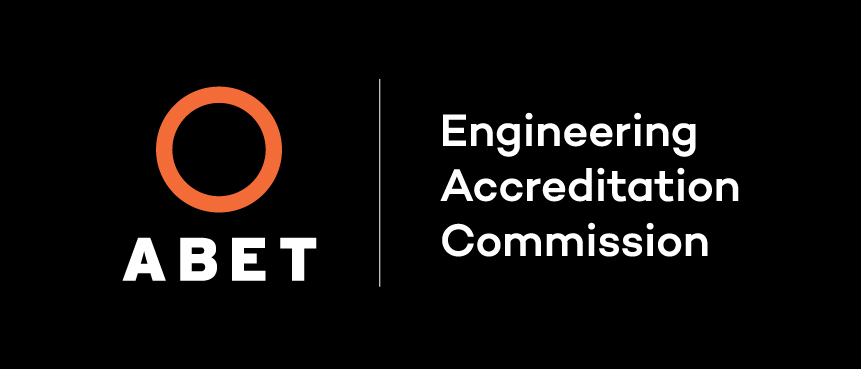
B.S. Program

The undergraduate program in Bioengineering is built upon a rigorous engineering science foundation with a broad curriculum in engineering and life sciences that students need to pursue graduate school, medical school or careers in the industry. Through the Bioengineering program, graduates acquire an understanding of biology, biochemistry, and physiology and the capability to apply advanced mathematics to solve problems at the interface of engineering and biology. Every day, you and your professors will work side-by-side in the lab on research into how engineers — in collaboration with physicians — can support the human body to prevent and solve medical problems.
Students are initially admitted to the General Engineering Program (GE) to explore various engineering fields and gain academic preparation for the first year. After completing one year in General Engineering, students choose either the biomaterials or bioelectrical concentration; each focuses on biomedical applications.
Undergraduate Biomedical engineering majors who have completed their junior year with a grade point ratio of 3.4+ can begin work toward a combined B.S./Graduate in Bioengineering. Students can count up to twelve hours of graduate credit (6000- and 8000-level courses).
-
Biomedical Engineering Curriculum
Freshman Year
First Semester Curriculum
All Engineering students begin their first term in General Engineering with the same courses, regardless of their intended major. Coursework in the second term varies.
- CH 1010 - General Chemistry (4)
- ENGL 1030 - Composition and Rhetoric (3)
- ENGR 1020 - Engineering Disciplines and Skills (3)
- MATH 1060 - Calculus of One Variable I (4)
- Arts & Humanities OR Social Science Requirement - (3)
Second Semester Curriculum
- CH 1020 - General Chemistry (4)
- ENGR 1410 - Programming and Problem Solving (3)
- MATH 1080 - Calculus of One Variable II (4)
- PHYS 1220 - Physics with Calculus I (3)
- Arts & Humanities OR Social Science Requirement - (3)
B.S. Biomedical Engineering, with Bioelectrical Concentration credit hours: 130
B.S. Biomedical Engineering, with Biomaterials Concentration credit hours: 131
Complete curriculum and program requirements for the B.S. in Biomedical Engineering can be found in the Clemson Course Catalog.
Combined B.S./M.S./M.Eng
Clemson Bioe students pursuing a B.S. degree have the opportunity to earn graduate credits during their senior year.
- Seniors with a 3.0 or higher GPA are eligible to request enrollment in graduate-level courses by completing the GS6 form.
- Seniors with an overall GPA of at least 3.4 are eligible to request participation in the Combined Bachelor’s/Master’s Plan. Under this plan, students can reduce the time needed to earn both the B.S. and M.S. degrees by applying graduate credits to both undergraduate and graduate program requirements. Interested students need to complete the GS6 B.S./M.S. form.
-
Department Honors Program
Departmental Honors in Bioengineering requires the following sequence of courses totaling 7 credit hours:
- BIOE H4150/6150 - Research Principles (1)
- BIOE H4910 - Mentoring Research in Bioengineering (1-4) for a total of 6 credit hours (satisfy the BIOE Technical Requirements)
The Departmental Honors program in Bioengineering offers exceptional training and practical experience in experimental research under the guidance of a faculty advisor. BioE H4150 offers academic training in research planning, ethical conduct, professional documentation and dissemination in both oral and written formats. Students are strongly encouraged to co-enroll in BIOE H4150 (6150 if pursuing a B.S./M.S. degree) during their first semester of BIOE H4910.
In BIOE H4910, students will review relevant, peer-reviewed literature, conduct a mentored research project, and present their findings in a poster or oral presentation (final semester) during the department’s research day, held near the end of each semester. During their final semester of the class, students must prepare a senior thesis that includes the background, methods, results, and conclusions of the research project, which must be approved by both the faculty advisor and the department's Honors Committee.
Clemson University Honors CollegeRelated Forms and Information:
-
Applying to the B.S. or B.S./M.S. Program
Undergraduate Degree
Applicants will apply to Clemson as a first-year student if they are a student without college credit or if they earned college credit prior to high school graduation. Completion of the first-year General Engineering curriculum and a minimum grade point average of 2.5 or higher is needed to begin the Bioengineering program.
Bachelors-to-Graduate Program
Application for this combined degree program should occur at the end of the junior year to meet the academic standing and GPA requirements. Application details are available in the Academic Regulations section of the Graduate Policies and Procedures Handbook.
How to Apply
Clemson University offers a Coalition Application, Clemson Application, and the Common Application. To learn more about the application process, deadlines, requirements and what to expect after applying, please review the First-Year Application Process.
The GS6-Bachelor-to-Graduate Plan form on the graduate school site (Forms -> Current Students) will serve as your application to the bioengineering graduate program – no additional application is required. However, while the Graduate Record Exam (GRE) is not mandatory, some fellowship applications may require GRE scores.
 The Bachelor of Science in Biomedical Engineering program is accredited by the Engineering Accreditation Commission of ABET,
The Bachelor of Science in Biomedical Engineering program is accredited by the Engineering Accreditation Commission of ABET, 